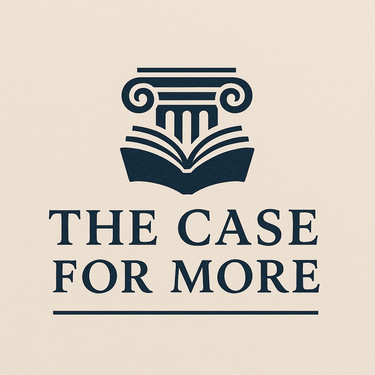Did Kirk Disprove Catholicism?
A response to Charlie Kirk and Michale Knowles’ conversation about Catholicism and the Papacy.
CATHOLICISMCOMMENTCHRISTIANITYUS
1/16/20256 min read


During a recent political talk between the Catholic Daily Wire host Michael Knowles, and the conservative co-founder of Turning Point USA Charlie Kirk, the topic of Catholicism came up, and it showed many of the pitfalls evangelicals often fall into when confronting Catholicism.
The video, titled ‘Is the Pope Legit? Catholicism v. Protestantism Debate Ft. Michael Knowles’ was uploaded to Charlie Kirks YouTube channel on 3rd January, and has caused quite a stir amongst Catholic conservatives online.
The context of the ‘debate’ was that an audience member had asked Knowles “what advice would you give to somebody who is trying to spread the love of the Eucharist to the world.”
Knowles’ response highlighted the nobility of the question’s goal, and proposed the person recite Aquinas Creator Ineffabilis prayer regularly, for God to illumine the mind.
Knowles also, in a slight and well-intention jibe at Kirk, suggested that the questioner, as a Catholic, does not need to ‘reinvent the wheel every year’, but to use the 2000 years of traditions and teachings of the Church – going on to say he was trying to convince Kirk of Catholicism.
Kirk’s response? “Your goal should be to bring people to Jesus, not Catholicism”.
And this is where the ‘debate’ begins.
I use ‘debate’ in invert commas because this was not a debate despite the video’s name. What becomes clear throughout the conversation is that Knowles is trying to be collegiate and well-mannered as a guest to Kirk’s event, but that Kirk wants an argument.
Knowles raises some good responses as we will discuss; but ultimately, if we use debate language, Kirk ‘wins’ the exchange. He does not ‘win’ on the merits of his arguments, but on his skill as a debater and Knowle’s politeness. However, this somewhat misses the point.
Knowles is a well-catechised Catholic, who, as a revert, has thought through his faith thoroughly, but as guest of Kirk he was unusually reserved in his responses.
So, let’s look at some of the points Kirk raises, and consider how they might be opposed in a true ‘debate’ setting.
Firstly, Knowles responds to Kirks initial point excellently – “hang on, what is the difference [between Jesus and Catholicism]?”
Knowles points to Catholicism being ‘the fullness of the truth’, and therefore, if one arrives fully at Christ, one arrives at the Catholic Church.
In response Kirk then skips through several topics including Mariology, Transubstantiation, denominationalism, canonicity, and the Papacy.
For several of these points Knowles repeatedly and politely affirms Kirk’s faith – Kirk as far as we know is a validly baptised person – but, in line with Catholic doctrine, says that he is ‘confused’ about some aspects.
Kirk segways to asking whether Christianity requires belief in ‘Mariology’.
Now what aspects of Mariology Kirk means is unclear; all denominations have a Mariology, even if it’s just the virgin birth. But let’s assume that he means more orthodox doctrines.
A good Mariology is important, not because ‘Catholics worship Mary’ as is often cried in such discussions, but because the fullness of Christ’s humanity and divinity is crucial.
To avoid Nestorianism (the heresy that Christ’s divine and human natures were separate), it is important to emphasise Mary as the Mother of God. This is not an attribution to Mary for the glorification of her person, but a reflection of sound Christology. Other Marian doctrines naturally proceed from this, but always to tell us something about Christ.
The original question was about bringing people to the Eucharist, but Kirk’s comments about not believing in transubstantiation go fairly unchallenged.
Whether we use the Latin and Aristotelian philosophy of ‘Transubstantiation’, or ‘Divine Mystery’, or ‘Real Presence’, it doesn’t matter; the Church, for all of its history, from Jesus’ Bread of Life discourse John 6:25-59 to the present, has taught and believed that Christ is truly present – body, soul and divinity – in the consecrated bread and the wine.
Kirk’s initial response to ‘focus on Jesus’ is fundamentally flawed on the assumption that the Eucharist is not Christ. As an evangelical, it’s not unfair to assume Kirk’s view is that it is a symbol of Jesus’ body, but this is not correct.
“53 So Jesus said to them, “Very truly, I tell you, unless you eat the flesh of the Son of Man and drink his blood, you have no life in you… 56Those who eat my flesh and drink my blood abide in me, and I in them.” (John 6:53, 56)
When we bring people to the Eucharist, we are, in the fullest sense, bringing them to Jesus.
With regards to denominationalism, this comes up in various forms throughout the exchange, and Knowles remains generously ecumenical. However, Kirk is the one who shows the flaws of denominationalism.
In response to a question from Knowles about what to do if there is disagreement on important doctrines, Kirk, not obviously joking, says “we schism, and say you guys got it wrong… or we do a reformation.” Later on, Kirk says, “if my pastor starts saying crazy things, I find a new pastor.”
Kirk is right – in Protestantism, if there is disagreement, there is separation. If the church doesn’t fit my interpretation, I move to one that does.
The irony seems lost on Kirk, not least that denominationalism is in stark contrast to Paul’s commands to the Corinthians to follow Christ’s unified body instead of ‘Paul… Apollos… [or] Cephas’ (1 Cor 1:11-17).
Knowles response is a good one. Instead of going to a new pastor or causing schism, you take the issue up the Christ-instituted hierarchy. “One of the marks of the Church is unity” says Knowles – Cata-holos, Catholic, according to the whole.
And so to the crux of the conversation, the Papacy.
Kirk’s main problem, it seems, is that he sees Francis as being too liberal and too Marxist. In an admittedly funny quip, Kirk says, “by the fruit you will know it, and you have very Marxist fruit.”
Pope Francis is known for having said some questionable things, and clearly has some liberation theology leanings. However, the issue with Kirk’s comments is that Francis is the not concept ‘Papacy’ – he is one Pope among many.
The Church has always had bad Popes, not that Francis necessarily is one, but many have been far worse than him as Catholics will know.
Peter, the first Pope, denied Christ three times and was rebuked by Paul for his Judaising favouritism. Popes are people, and people are imperfect.
Knowles, who clearly has criticisms of Francis himself, does concede Francis has his issues, but continues to respect the office. In a jesting Italian accent of his Sicilian heritage, he makes a serious point; Kirk is taking Francis’ remarks with more authority than most Catholics do.
The papacy (and Francis particularly) is very easy to straw-man – but nothing is accomplished. By saying he disagrees with Francis, Kirk has not invalidated the claim that Peter and his successors hold the keys to the kingdom given by Jesus. He merely showed reasons why one might, as Knowles expressed, ‘turn down the volume’ on what this particular Pope is saying in informal interviews.
Knowles does note though that what the Pope says on doctrinal matters is important – especially ex cathedra– but that this doesn’t mean everything every Pope says is infallible.
Kirk, like many Protestant objectors, conflates the issue of the Papacy, with ‘is Francis a good Pope?’ They are not the same issue.
Finally, thrown into the mix is Knowles asking Kirk where he thinks the biblical canon comes from, but Kirk never answers, instead subtly and swiftly changing the topic to the 66 versus 73 book canon.
What prompts this part of the discussion is Kirk’s claim is that if a ‘church’ has the Bible at the centre, ‘it’s going to last’.
The problems should be evident. What about groups Kirk presumably considers heretical? Jehovah’s Witness? Oneness Pentecostals? Seventh Day Adventists? These have the Bible, but I suspect Kirk would be hesitant to call them a ‘true church’.
Kirk’s question is, ‘why believe a 73 book canon when Rabbinic Jews themselves only use 66.’ However, this is not entirely correct, and misunderstands Judaism at the time of Christ.
What’s more, it misunderstands the difference between the Masoretic texts, and the Septuagint. However, lots has been written on this and so I won’t labour the point, suffice to say the error of Kirk’s points is saying that Catholics changed the canon so they could support their ‘unbiblical’ doctrines – the exact opposite of the truth.
Nevertheless, as Knowles points out, Christians are not Jews, and so what matters is what the early Church – which used the longer Septuagint Old Testament – believed.
Kirk did give credit to Catholics in places, particularly on abortion, and the conversation was generally cordial. Knowles did well to respond to the sudden change of pace and topic of the conversation, but the moment was inopportune for a proper debate or rebuttals.
What Knowles in this discussion shows us is that, as 1 Peter 3:15 tells, we must always be ready to give an answer for the hope within us.
I think Knowles did this – if only a little too gently.
Insights
Think Deep. Live Well. Be Free.
CONTACT US:
© 2024. All rights reserved.
